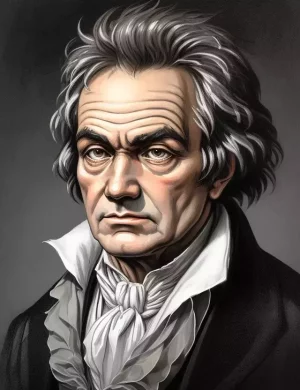Ludwig van Beethoven
Early Life and Musical Prodigy
Ludwig van Beethoven, born on December 16, 1770, in Bonn, Germany, exhibited musical talent from an early age. Recognizing his prodigious abilities, his father, Johann van Beethoven, served as his first music teacher. Beethoven's early compositions hinted at the genius that would later define his career.
Transition to Vienna
Beethoven moved to Vienna in 1792, seeking guidance from renowned composer Joseph Haydn. Under Haydn's mentorship, Beethoven expanded his musical horizons and began to establish himself as a virtuoso pianist and composer in the vibrant Viennese musical scene.
Deafness and Triumph Over Adversity
One of the most poignant aspects of Beethoven's life was his gradual loss of hearing, beginning in his late twenties. Despite facing profound deafness, he continued to compose masterpieces that showcased his innovative spirit. His ability to overcome adversity is evident in works like the Ninth Symphony, composed when he was almost completely deaf.
Revolutionary Compositions
Beethoven's compositions marked a departure from classical conventions, introducing a sense of emotional depth and individual expression. Some of his most celebrated works include:
- Symphony No. 3 in E-flat Major, Op. 55 ('Eroica'): A groundbreaking symphony that signaled Beethoven's move towards a more expansive, heroic style.
- Piano Sonata No. 14 in C-sharp Minor, Op. 27, No. 2 ('Moonlight Sonata'): A beloved piano composition known for its emotional resonance and evocative melodies.
- Symphony No. 9 in D Minor, Op. 125 ('Choral'): A monumental work that includes the triumphant 'Ode to Joy,' expressing themes of universal brotherhood.
- String Quartet No. 14 in C-sharp Minor, Op. 131: A complex and deeply emotional chamber music masterpiece.
Personal Struggles and Relationships
Beethoven's personal life was marked by struggles, including his strained relationship with his family and unfulfilled romantic pursuits. His famous 'Immortal Beloved' letter, addressed to an unknown lover, remains a subject of speculation and fascination.
Legacy and Influence
Ludwig van Beethoven's legacy is immeasurable, and his impact on Western classical music is profound. His compositions bridged the Classical and Romantic eras, inspiring countless musicians and composers. Beethoven's innovative spirit and enduring melodies continue to captivate audiences worldwide, making him a symbol of artistic brilliance and resilience.
